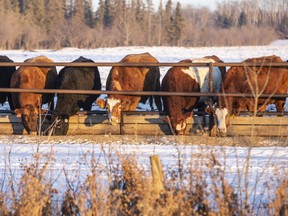Politics
Farmers Challenge CFIA’s Competence Amid Livestock Cull Crisis

Concerns have intensified among Canadian farmers regarding the competence of the Canadian Food Inspection Agency (CFIA) in managing cull operations. This issue extends beyond ostriches to encompass cattle, elk, and poultry farmers who are increasingly dissatisfied with the agency’s communication and decision-making processes. Farmers claim that the compensation provided after culls is insufficient and often arrives months too late, leaving them struggling to recover from the financial impact.
Diane Sawley, a representative of Anchor P Cattle Company in Alberta, testified before the House of Commons agriculture committee last month, outlining the challenges faced by her ranch. In July, her cows were flagged for testing after purchasing individuals from a herd that was later found to have tuberculosis. The quarantine process was labor-intensive, requiring approximately 800 man hours to gather and test each animal within a tight timeframe. Sawley described the CFIA’s lack of logistical understanding as “clueless,” highlighting that the testing process involves multiple steps, including blood tests and monitoring for several days.
The results of the testing were grim: eleven cows tested positive and had to be culled. Sawley emphasized that the farm would not receive compensation for these losses, stating, “In addition to gathering and testing costs, several other expenses were incurred, including the loss of grazing range, disruptions in breeding programs, and missed marketing opportunities.” With the current cattle market at historic highs, the inability to sell cattle during the quarantine period has compounded the stress for farmers.
Erin Sawley, from East Point Cattle Corporation in Saskatchewan, shared her distressing experience with the CFIA. After winning an agricultural award in 2024, her farm faced devastation when its entire herd of 2,000 cattle was culled in February 2025 due to a positive tuberculosis case. It took until the end of March for the CFIA to complete the cull, forcing Sawley to bear the costs of caring for the animals during that time. As she awaits compensation, she expressed frustration with the CFIA’s lack of clear communication: “We still don’t know. We’re 304 days in, and we have no idea what our compensation is going to look like.”
The compensation process itself has drawn criticism. Farmers are paid based on CFIA evaluations, which are subject to legislative caps. Erin Sawley indicated that the valuations had to be outsourced due to insufficient internal expertise within the CFIA: “People internally in the CFIA have very little cattle knowledge.” In contrast, compensation for livestock lost to wildlife predation in Saskatchewan is calculated using recent market rate data, providing a more equitable approach.
The challenges faced by poultry and elk farmers mirror those of cattle producers. In Manitoba, the Keystone Agricultural Producers recently requested a parliamentary review of compensation amounts, stating that current valuations do not reflect the economic realities of farming. Elk farmers, particularly those dealing with chronic wasting disease (CWD), have also faced significant delays in compensation, as evidenced by a case in 2017 where a farm did not receive valuations until 2019.
On November 6, 2023, a CFIA director faced questions from the Commons agriculture committee regarding the operational difficulties farmers encounter. In response, she suggested that farmers communicate directly with local inspectors or area-level executives. This recommendation, however, has proven ineffective for many, as demonstrated by the farmers’ need to escalate their concerns to Parliament.
The recent handling of ostrich cases, in which birds suffered prolonged distress before being culled, has only further eroded trust in the CFIA. The agency’s management of animal health and culling remains under scrutiny as farmers from various sectors continue to voice their grievances, revealing a systemic problem that demands urgent attention and reform.
As these farmers navigate the complexities of animal health regulations and compensation processes, their futures hang in the balance. The CFIA’s ability to improve its operations and regain the trust of the agricultural community will be crucial in addressing these ongoing challenges.
-

 Politics1 week ago
Politics1 week agoSecwepemc First Nation Seeks Aboriginal Title Over Kamloops Area
-

 World4 months ago
World4 months agoScientists Unearth Ancient Antarctic Ice to Unlock Climate Secrets
-

 Entertainment4 months ago
Entertainment4 months agoTrump and McCormick to Announce $70 Billion Energy Investments
-

 Lifestyle4 months ago
Lifestyle4 months agoTransLink Launches Food Truck Program to Boost Revenue in Vancouver
-

 Science4 months ago
Science4 months agoFour Astronauts Return to Earth After International Space Station Mission
-

 Technology3 months ago
Technology3 months agoApple Notes Enhances Functionality with Markdown Support in macOS 26
-

 Top Stories1 month ago
Top Stories1 month agoUrgent Update: Fatal Crash on Highway 99 Claims Life of Pitt Meadows Man
-

 Sports4 months ago
Sports4 months agoSearch Underway for Missing Hunter Amid Hokkaido Bear Emergency
-

 Politics3 months ago
Politics3 months agoUkrainian Tennis Star Elina Svitolina Faces Death Threats Online
-

 Politics4 months ago
Politics4 months agoCarney Engages First Nations Leaders at Development Law Summit
-

 Technology4 months ago
Technology4 months agoFrosthaven Launches Early Access on July 31, 2025
-

 Top Stories3 weeks ago
Top Stories3 weeks agoFamily Remembers Beverley Rowbotham 25 Years After Murder





















